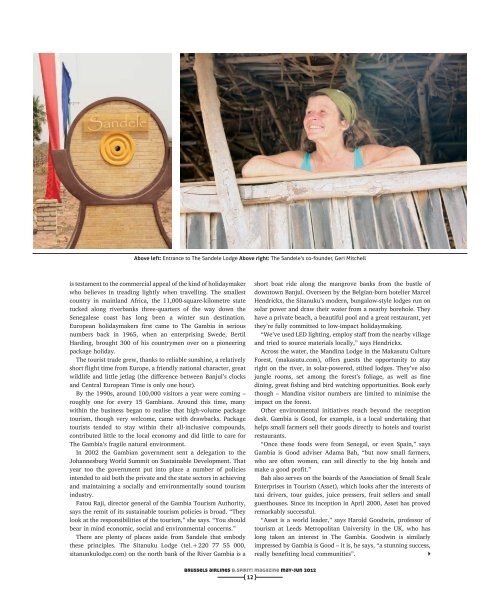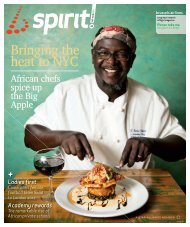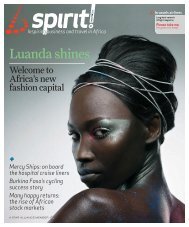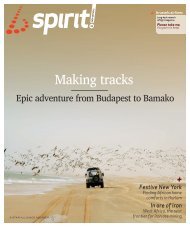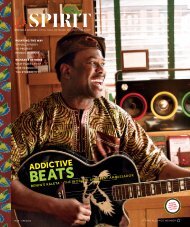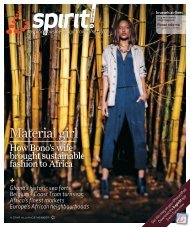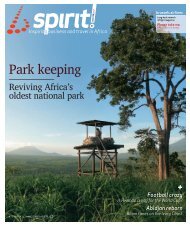may-2012
may-2012
may-2012
Create successful ePaper yourself
Turn your PDF publications into a flip-book with our unique Google optimized e-Paper software.
Above left: Entrance to The Sandele Lodge Above right: The Sandele's co-founder, Geri Mitchell<br />
is testament to the commercial appeal of the kind of holidaymaker<br />
who believes in treading lightly when travelling. The smallest<br />
country in mainland Africa, the 11,000-square-kilometre state<br />
tucked along riverbanks three-quarters of the way down the<br />
Senegalese coast has long been a winter sun destination.<br />
European holidaymakers first came to The Gambia in serious<br />
numbers back in 1965, when an enterprising Swede, Bertil<br />
Harding, brought 300 of his countrymen over on a pioneering<br />
package holiday.<br />
The tourist trade grew, thanks to reliable sunshine, a relatively<br />
short flight time from Europe, a friendly national character, great<br />
wildlife and little jetlag (the difference between Banjul’s clocks<br />
and Central European Time is only one hour).<br />
By the 1990s, around 100,000 visitors a year were coming –<br />
roughly one for every 15 Gambians. Around this time, many<br />
within the business began to realise that high-volume package<br />
tourism, though very welcome, came with drawbacks. Package<br />
tourists tended to stay within their all-inclusive compounds,<br />
contributed little to the local economy and did little to care for<br />
The Gambia’s fragile natural environment.<br />
In 2002 the Gambian government sent a delegation to the<br />
Johannesburg World Summit on Sustainable Development. That<br />
year too the government put into place a number of policies<br />
intended to aid both the private and the state sectors in achieving<br />
and maintaining a socially and environmentally sound tourism<br />
industry.<br />
Fatou Raji, director general of the Gambia Tourism Authority,<br />
says the remit of its sustainable tourism policies is broad. “They<br />
look at the responsibilities of the tourism,” she says. “You should<br />
bear in mind economic, social and environmental concerns.”<br />
There are plenty of places aside from Sandele that embody<br />
these principles. The Sitanuku Lodge (tel.+220 77 55 000,<br />
sitanunkulodge.com) on the north bank of the River Gambia is a<br />
brussels airlines b.spirit! magazine <strong>may</strong>-jun <br />
{ 12 }<br />
short boat ride along the mangrove banks from the bustle of<br />
downtown Banjul. Overseen by the Belgian-born hotelier Marcel<br />
Hendrickx, the Sitanuku’s modern, bungalow-style lodges run on<br />
solar power and draw their water from a nearby borehole. They<br />
have a private beach, a beautiful pool and a great restaurant, yet<br />
they’re fully committed to low-impact holidaymaking.<br />
“We’ve used LED lighting, employ staff from the nearby village<br />
and tried to source materials locally,” says Hendrickx.<br />
Across the water, the Mandina Lodge in the Makasutu Culture<br />
Forest, (makasutu.com), offers guests the opportunity to stay<br />
right on the river, in solar-powered, stilted lodges. They’ve also<br />
jungle rooms, set among the forest’s foliage, as well as fine<br />
dining, great fishing and bird watching opportunities. Book early<br />
though – Mandina visitor numbers are limited to minimise the<br />
impact on the forest.<br />
Other environmental initiatives reach beyond the reception<br />
desk. Gambia is Good, for example, is a local undertaking that<br />
helps small farmers sell their goods directly to hotels and tourist<br />
restaurants.<br />
“Once these foods were from Senegal, or even Spain,” says<br />
Gambia is Good adviser Adama Bah, “but now small farmers,<br />
who are often women, can sell directly to the big hotels and<br />
make a good profit.”<br />
Bah also serves on the boards of the Association of Small Scale<br />
Enterprises in Tourism (Asset), which looks after the interests of<br />
taxi drivers, tour guides, juice pressers, fruit sellers and small<br />
guesthouses. Since its inception in April 2000, Asset has proved<br />
remarkably successful.<br />
“Asset is a world leader,” says Harold Goodwin, professor of<br />
tourism at Leeds Metropolitan University in the UK, who has<br />
long taken an interest in The Gambia. Goodwin is similarly<br />
impressed by Gambia is Good – it is, he says, “a stunning success,<br />
really benefiting local communities”.


